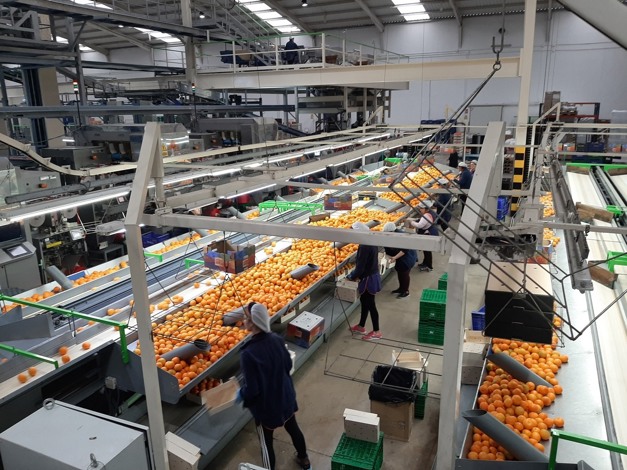The parties negotiating the Collective Agreement for Citrus Fruit Handling and Packing of the Valencian Community -i.e. the social partners (UGT and CCOO) and the employers (Citrus Management Committee, CGC -which has the largest representation- and the Federation of Agri-food Cooperatives of the Valencia Region)- have met four times since October 3. This agreement will regulate the working conditions of more than 55,000 workers in the Valencian Community, but its impact affects the entire sector, as 70% of the country's fresh citrus is packed and dispatched from this region.

"The social partners suspended two appointments. Then we were affected by the DANA of October 29; the region's biggest natural disaster this century leaving incalculable human and material damage. After that, the sector has had to stop harvesting and marketing its crops for three weeks due to the rains. Now, after only four meetings, a strike has already been announced for the beginning of December, a month in which the future of the whole season is at stake. The unions don't want to negotiate. They've proven that they want to take advantage of the circumstances and the sector's weaknesses as a whole," stated the president of the CGC, Inmaculada Sanfeliu. The private trade's main demand has been rejected: the warehouses need to work on Saturdays and some public holidays (always respecting the prescribed rest periods and the 40-hour working week) to preserve the service, which is their main competitive weapon to face the cheaper offer from Egypt, Morocco, and -at specific times of overlapping in the off-season- South Africa.
The negotiations so far have been lightning fast: On October 3, the social partners presented their platform and on October 21, the employers presented theirs. At the request of the trade unions, but in a consensual manner, the two meetings scheduled for November 28 and 4 were suspended because the social partners could not attend them. Then, given the very complicated circumstances caused by the DANA, on November 11 the employers offered to reach a quick agreement, leaving aside the claims of both platforms, focusing on a wage increase for each of the four years of the agreement, and schedule flexibility (which entails working on Saturdays and holidays). Last Monday, after consulting their bases, the workers' representatives rejected this proposition, demanded to resume talks based on their demands, and issued an ultimatum followed by a statement warning of the aforementioned strike.
Most of the marketing of the country's two main varieties - Navelina orange and Nules clementine - takes place in December, a month that is also key to preparing for the Christmas campaign, which is the same as saying that it is the key to the whole season. Moreover, this year, after three weeks of practical paralysis due to the rains, exporters are also facing the difficult situation of moving hundreds of thousands of tons that have to be harvested, handled, and sent to large-scale distribution in the EU which buys 85% of the fresh Spanish produce (93% if we include consumption in the UK). "Going on strike at this time of the year is irresponsible because it will cause us to lose an important part of our production, handing over the market's supply to our competitors (Morocco for clementines/mandarins and Egypt for oranges) who have labor and production costs that are up to ten times lower than ours."
That's why the unions must review their no to the flexibility demanded. "The Spanish citrus sector can only differentiate itself by its 'service'. Service can make us indispensable or, failing that, absolutely dispensable. European consumers buy on weekends so we need to work on weekends, just like so many other sectors," Sanfeliu stressed.
So far, there's only been progress in the discussion on the proposed remuneration based on the workers' professional classification, for which the social partners did not bring a concrete proposal to the table. This did not prevent the unions from rejecting all the modifications proposed by the CGC on this point, and in fact, they ended up requesting salary increases that range from 14%, 24%, 29%, 38%, and 69% for certain categories. In addition to this improvement for certain categories, the unions have demanded an 11% wage increase in the first year for all workers and a 3% increase in the following two years, with a wage revision clause if the CPI exceeds these figures, as well as the payment of an additional 3% for shift work. They also demand that structural hours - which are currently paid at a 15% surcharge on ordinary wages and which refer to all the overtime that can be worked from Monday to Saturday morning - disappear and that they are paid at a 25% surcharge.
The CGC considers these proposals unacceptable. According to calculations, all these increases would mean that for the specialty in which they are demanding the greatest improvement, the salary for a structural hour would increase by 217% and that for the specialties with a smaller improvement, the ordinary hour would increase by 31%, 93%, and 14%, respectively. "If warehouses cannot work on Saturdays and holidays after covering the legally established breaks, it is impossible to assume such increases. It's not our decision, it's the European retail sector that demands it: either we are in or out. If we don't do it, others will," Sanfeliu stated.
For more information:
